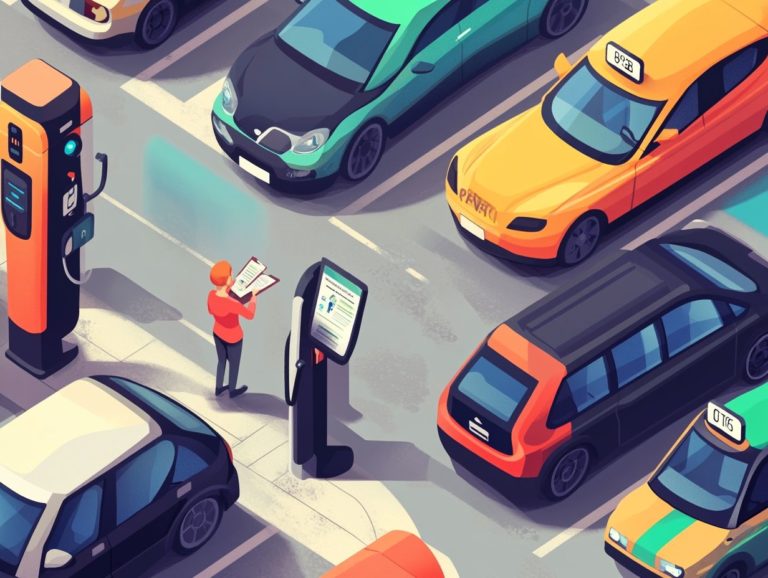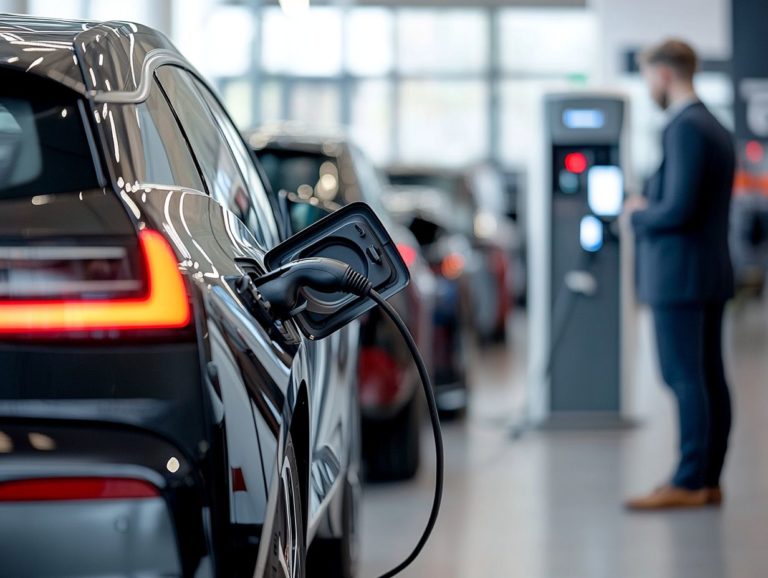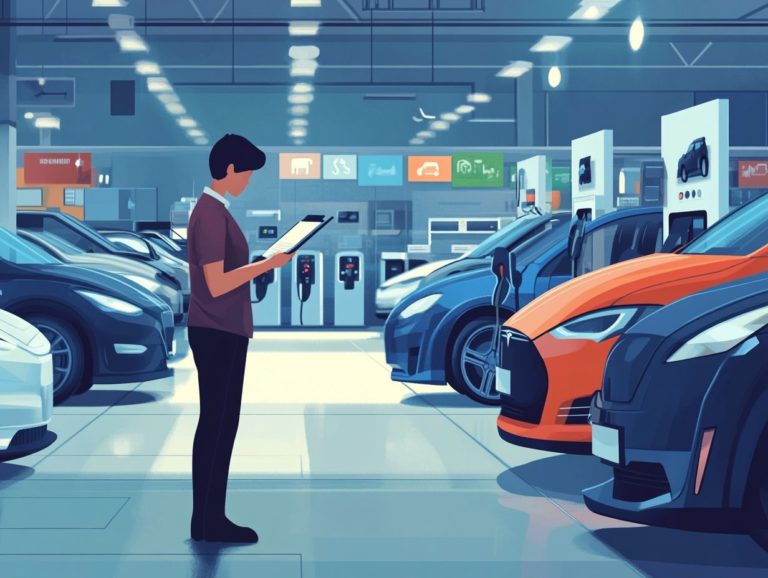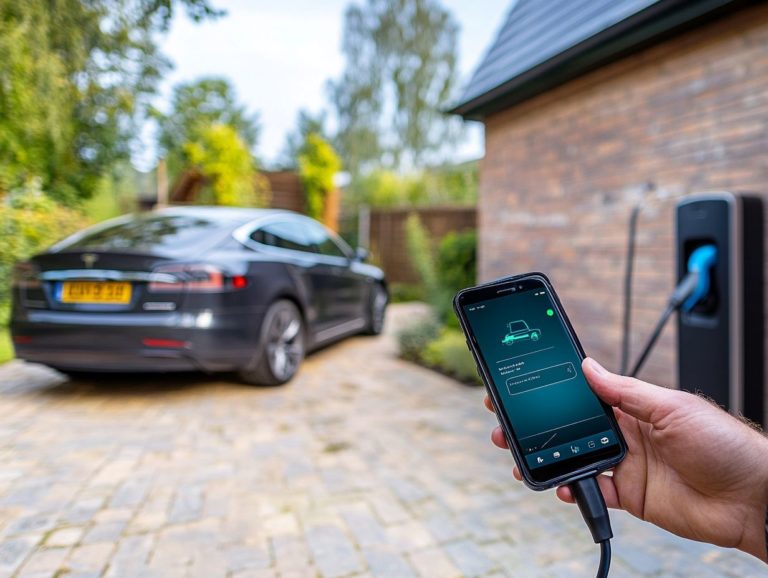A Quick Guide to EV Financing Options
Electric vehicles (EVs) are quickly becoming the top choice for many. However, navigating the financing landscape can feel overwhelming.
Ready to dive into the world of EV financing? This guide has all the insights you need!
This guide offers an overview of the different EV financing options available to you. It highlights the key differences between leasing and buying and explains the roles that traditional and alternative lenders play in the process.
Remember to consider your budget, credit score, and any available incentives that could enhance your purchase.
Discover how to select the financing option that best suits your needs and learn strategies to maximize your savings.
Are you ready to make a difference with your choice of vehicle? Let s explore the possibilities!
Contents
- Key Takeaways:
- Types of EV Financing Options
- Factors to Consider Before Financing an Electric Vehicle
- How to Choose the Right EV Financing Option
- Tips for Successful EV Financing
- Frequently Asked Questions
- What are the different financing options available for purchasing an electric vehicle?
- What is the benefit of purchasing an electric vehicle with cash?
- How does leasing an electric vehicle work?
- What are the advantages of leasing an electric vehicle?
- Can I finance an electric vehicle through a bank or credit union?
- Are there any government incentives or rebates available for electric vehicle financing?
Key Takeaways:

- Leasing and buying are the main options for financing an EV. Consider your budget and credit score to find the best fit for you.
- Compare interest rates and terms from both traditional and alternative lenders. Don t forget to factor in available incentives and rebates.
- Always negotiate with lenders and read the fine print closely before finalizing an EV financing agreement. A smart financing strategy can maximize your savings.
What is EV Financing?
EV financing includes various options tailored for electric vehicles. These options are gaining popularity due to their environmental benefits, like reduced emissions and improved energy efficiency. This financial landscape supports eco-conscious consumers and businesses aiming to foster a greener future while embracing corporate social responsibility.
The market for EV financing is rapidly expanding to meet the rising demand, thanks to an array of government incentives and green loans available. Unlike traditional financing methods that focus solely on the vehicle’s price, EV financing offers a range of tailored solutions, including leases, loans, and partnerships with utility companies. It’s important to understand what to know about leasing vs buying an EV to make an informed decision.
These innovative options simplify the transition to electric mobility for both individuals and businesses. The attractive benefits, such as lower operational costs and potential tax credits, further enhance the appeal of electric vehicles.
Businesses are motivated by both economic savings and sustainability. They also see an opportunity to strengthen their brand’s commitment to eco-friendliness, which resonates deeply with environmentally conscious consumers. This combined effect significantly accelerates the shift toward electric vehicles in the marketplace.
Types of EV Financing Options
When considering EV financing options, you can choose between leasing and buying, each with distinct financial benefits and implications for your long-term ownership experience. Additionally, it’s helpful to understand how to navigate EV purchase agreements to make an informed decision.
While traditional financing methods are still common, alternative lenders and green loans are on the rise, offering flexible financing solutions designed specifically for electric vehicles.
Understanding these options is essential for eco-conscious consumers who want to make informed decisions that align with their financial goals and business objectives.
Leasing vs. Buying
Are you torn between leasing and buying an electric vehicle? Let s break down the pros and cons to help you decide! Leasing and buying electric vehicles each come with their own set of advantages and challenges. Your choice will largely hinge on your financial situation, preferences for upfront costs, and long-term savings goals.
If you prefer lower upfront costs and reduced maintenance expenses, leasing could be the perfect fit for your flexible lifestyle. On the other hand, if stability and long-term savings through the value you build over time appeal to you, purchasing might be the way to go.
Leasing allows you to drive newer models every few years. These cars come with the latest technology and features, enhancing your driving experience. In contrast, buying an electric vehicle involves paying for the entire vehicle upfront or through financing, but it also opens the door to certain tax credits that can help offset your costs.
Don t overlook maintenance savings either; leased vehicles often come with warranty coverage that can significantly reduce repair expenses. As a vehicle owner, you might find yourself investing more in upkeep as your car ages. Ultimately, each option caters to different lifestyles and money plans, making your decision all the more important.
Traditional vs. Alternative Lenders
Choosing between traditional financing and alternative lenders is crucial for eco-conscious consumers like you, seeking optimal electric vehicle financing solutions tailored to your unique needs. Traditional financing options usually come from established financial institutions, while alternative lenders often present more innovative and flexible financing strategies. This aligns perfectly with the expanding market for electric vehicles and the concerns of environmentally minded individuals and businesses.
Interest rates and loan terms can change. Assessing each option is vital for your decision-making. Traditional banks may provide a sense of stability, but they often come with stricter requirements and less competitive rates, especially if you have a limited credit history.
Conversely, alternative lenders tend to focus on accessibility and customization, allowing you to secure loans that resonate with your values and financial circumstances. These lenders can be particularly appealing if you may not qualify for conventional financing yet are still committed to embracing sustainable technologies.
In this evolving landscape, the role of financial institutions becomes increasingly critical as they strive to promote EV adoption while balancing their lending portfolios and maintaining financial health.
Factors to Consider Before Financing an Electric Vehicle

Before you finance an electric vehicle, there are several essential factors you need to consider. These include your budget constraints, personal credit score, and the availability of incentives and rebates that can significantly affect the total cost of ownership.
It’s crucial for you to analyze your financial projections thoroughly, as these elements play a vital role in shaping your financing strategies and long-term savings. By doing so, you can maximize the benefits of government incentives, such as the federal EV tax credit, ensuring you make a well-informed decision.
Budget and Credit Score
Establishing a solid budget and understanding your credit score are essential steps in securing the best electric vehicle financing options available to you, as they directly influence the types of financing and car loans at your disposal.
By taking the time to create a detailed budget, you can gain a clearer picture of your monthly expenses, allowing you to determine how much you can comfortably allocate toward an electric vehicle payment. A well-informed understanding of your credit score equips you to negotiate more effectively with lenders, potentially unlocking exclusive offers and lower interest rates.
These financial foundations are pivotal in determining which incentives and rebates may apply, enhancing your purchasing experience. This gives you the power to make informed decisions that align with your financial situation and environmental aspirations.
Available Incentives and Rebates
Explore available incentives and rebates, like government programs and the federal EV tax credit! These can help you save a lot of money when switching to electric vehicles. By taking advantage of these offers, you can significantly reduce your upfront costs and enhance your long-term savings, making EV financing a compelling choice for those eager to embrace a sustainable future.
Various state and local programs provide extra financial benefits, offering additional rebates or grants that lower the purchase price of electric vehicles even further. In many areas, you might also find incentives for installing home charging stations, which can elevate your total savings. This comprehensive approach not only helps you offset the initial investment but also fosters a wider shift toward cleaner transportation.
As you examine the total cost of ownership including savings on electric fuel and reduced maintenance expenses it becomes increasingly clear that taking advantage of these incentives can deliver significant financial relief for electric vehicle enthusiasts.
How to Choose the Right EV Financing Option
Selecting the ideal EV financing option demands careful research and thoughtful consideration of several factors. You’ll want to compare interest rates and fully grasp the terms tied to each financing strategy. Additionally, knowing how to choose between EV models can also inform your decision-making process.
It’s crucial to leverage the budgeting tools at your disposal to assess the implications of your choices. This way, you can confidently choose an option that reflects your environmentally friendly choices and aligns seamlessly with your long-term financial aspirations.
Comparing Interest Rates and Terms
When comparing interest rates and financing terms for EV loans, it’s essential to consider how these factors impact your financial stability and the overall cost of ownership. By understanding the effects of varying interest rates, you can make informed decisions that align with your budgeting needs and long-term savings goals.
Carefully reviewing different offers from lenders allows you to pinpoint the most competitive rates that fit your financial situation. This process involves evaluating not just interest rates but also examining loan durations, monthly payment structures, and any associated fees. A comprehensive approach can minimize long-term expenditures and enhance affordability.
Recognizing the importance of these comparisons fosters smarter financial habits, ultimately leading to enhanced savings and a more secure economic future. Investing time in exploring all available options gives you the power to make choices that align with your personal financial aspirations.
Understanding the Fine Print

Understanding the fine print in financing agreements is essential for making informed decisions about ownership implications and potential pitfalls in leasing versus purchasing options. By thoroughly reviewing the terms and conditions, you can ensure that you re fully aware of your responsibilities and can steer clear of unfavorable situations.
Pay attention to details like interest rates, payment schedules, and any hidden fees that might crop up down the line. Scrutinizing these key components allows you to better assess the total cost of your financing, which often extends far beyond that eye-catching sticker price.
Being aware of warranty coverage, maintenance responsibilities, and penalties for early payoff can significantly shape your overall experience and satisfaction with an electric vehicle. By taking the time to dissect these aspects, you position yourself to make financially sound decisions, embracing both environmental responsibility and economic viability in your choice of transportation.
Tips for Successful EV Financing
To achieve successful EV financing, consider employing key strategies like negotiating with lenders and maximizing your savings through available incentives and rebates. For detailed guidance, check out how to prepare for your first EV purchase.
These approaches not only help you secure favorable terms but also elevate your overall ownership experience, providing financial relief for those who are environmentally conscious.
Negotiating with Lenders
Negotiating with lenders is a crucial step in securing the best interest rates and terms for your EV financing. This allows you to explore flexible options that perfectly align with your budget.
By employing effective financial tools throughout the negotiation process, you can significantly enhance your overall financing experience. This paves the way for long-term savings and financial stability.
To navigate this landscape successfully, it s vital to equip yourself with knowledge about current market trends and lending practices. Utilizing tools like credit score calculators and loan comparison websites enables you to present your financial profile with confidence.
This preparation gives you the leverage needed to discuss not only interest rates but also the potential for refinancing options in the future.
Understanding the nuances of loan terms such as how long you ll pay back the loan and hidden fees gives you further power, leading to an advantageous agreement that aligns seamlessly with your financial objectives.
Maximizing Savings and Benefits
Getting the most savings and benefits when financing an electric vehicle means fully leveraging the available tax credits and rebates. This ultimately enhances the financial advantages of owning an EV.
Dive into these incentives now and watch your costs drop! By understanding and utilizing these incentives, you can substantially reduce your upfront costs while reaping the long-term financial rewards that electric vehicles provide.
To start, it s essential to thoroughly research the various federal, state, and local incentives that might apply to your purchase. Many areas offer additional rebates or tax credits that can further lower the initial expense of an EV.
Timing your purchase strategically can also work to your advantage. Align it with fiscal years or periods when government funding for these incentives is more abundant. Exploring financing options that incorporate these savings can amplify their impact, making electric vehicle ownership not just a responsible choice, but also a financially savvy one.
Engaging in conversations with dealerships about potential savings can unveil lesser-known incentives that enhance your financing experience. This makes the journey toward owning an EV even more rewarding.
Frequently Asked Questions
What are the different financing options available for purchasing an electric vehicle?

Some of the most common financing options for electric vehicles include purchasing outright with cash, leasing, or taking out a loan from a bank or credit union. To make an informed decision, it’s also helpful to know how to choose the best EV for your budget.
What is the benefit of purchasing an electric vehicle with cash?
Purchasing an electric vehicle with cash allows you to avoid paying interest on a loan and can help you negotiate a better price with the seller.
How does leasing an electric vehicle work?
Leasing an electric vehicle is similar to leasing a traditional car. You make monthly payments to use the vehicle for a set period, typically 2-3 years. At the end of the lease, you can choose to return the vehicle or purchase it at a predetermined price.
What are the advantages of leasing an electric vehicle?
Leasing an electric vehicle often requires a lower down payment and monthly payment compared to purchasing outright. It also allows you to upgrade to a newer model at the end of the lease term.
Can I finance an electric vehicle through a bank or credit union?
Yes, many banks and credit unions offer loans specifically for purchasing electric vehicles. These loans often come with competitive interest rates and flexible repayment terms.
Are there any government incentives or rebates available for electric vehicle financing?
Yes, many governments offer incentives or rebates for purchasing or leasing an electric vehicle. These can range from tax credits to discounted loan rates, so be sure to research what is available in your area.






